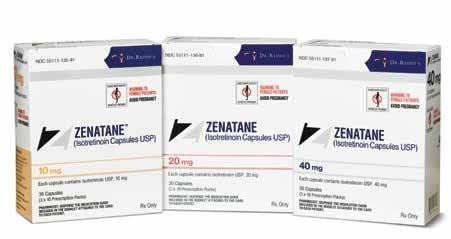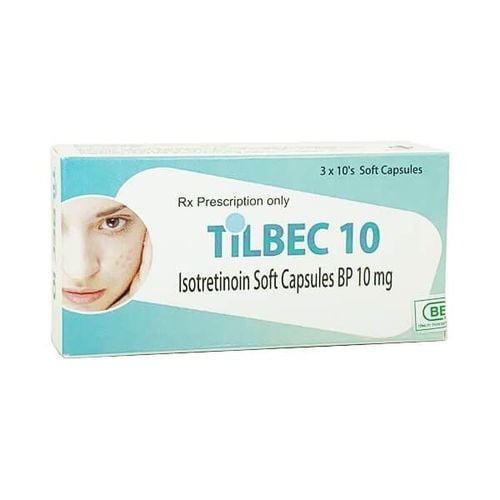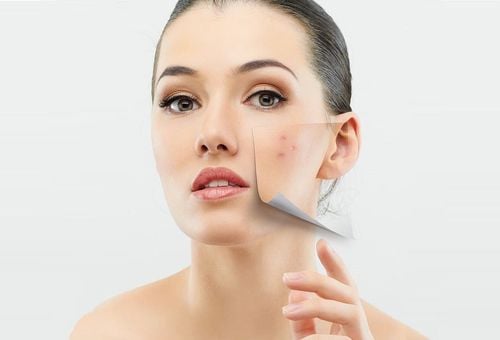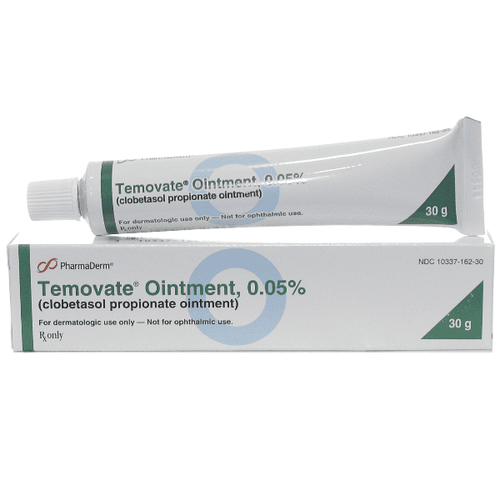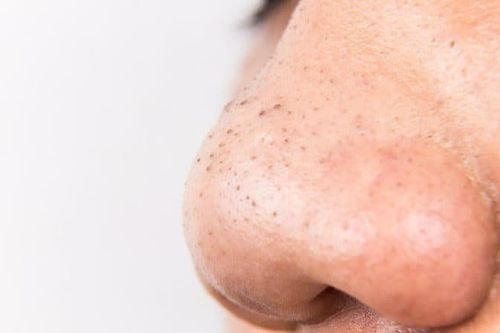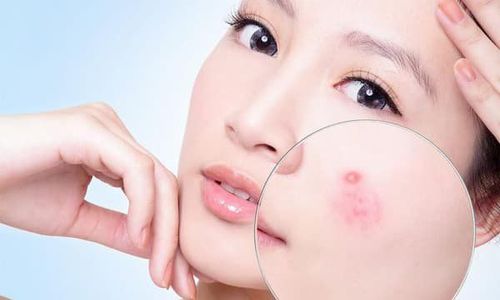This is an automatically translated article.
The nose is one of the most prone to pimples, because the pores in the nose are usually larger and can be more easily blocked than other locations. Accordingly, people can take care of and prevent acne on the nose from forming and unclog the hair follicles.
1. What is the cause of acne on the nose?
1.1 Clogged Pores Most cases of nose nodules are the result of excess oil and bacteria clogging the pores, causing breakouts on and around the nose.
1.2 Ingrown Hairs Sometimes nose hair can grow back into the skin as a result of shaving, waxing, or plucking.
1.3 Nasal vestibulitis This is a bacterial infection that occurs in the nasal vestibule, i.e. the anterior part of the nasal cavity. Risk factors for this condition are picking your nose, blowing your nose excessively, or wearing a nose piercing. At this time, Staphylococcus bacteria (staphylococci) are often the cause of white or red bumps inside the nose.
1.4 Nose Pimples Nasal pimples are a sign of an infection deeper inside the nose. This condition can sometimes lead to cellulitis, a skin infection that can spread into the bloodstream and to other organ systems.
2. How to treat acne on the nose?
2.1 Topical Creams Salicylic acid and benzoyl peroxide are key ingredients in topical creams that help control acne by helping to clear clogged pores and reduce the appearance of breakouts on the nose.
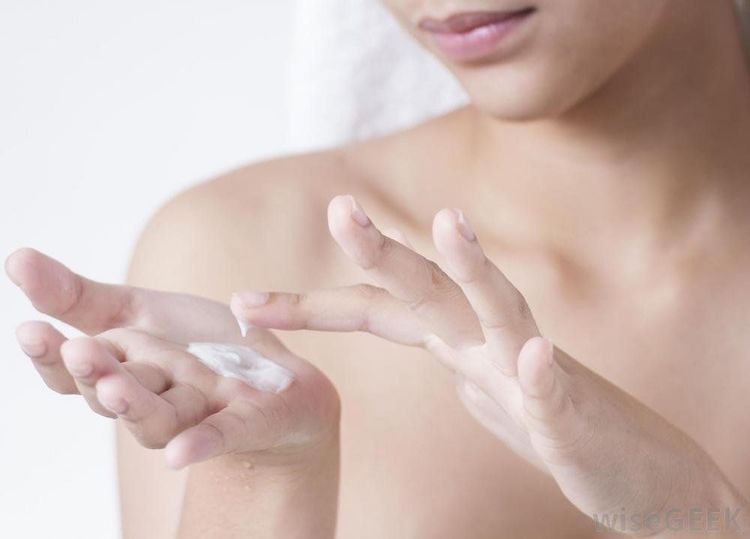
Một số loại kem bôi ngoài da trị mụn bọc ở mũi
2.2 Pain relievers, anti-inflammatory Pain relievers and anti-inflammatory drugs such as acetaminophen, ibuprofen, and naproxen sodium are generally over-the-counter to help improve discomfort and fight inflammation caused by nasal cysts.
2.3 Antiseptics Topical antiseptics both kill bacteria, control the inflammatory response, and can help relieve pain. Tea tree oil is a natural antiseptic treatment on the skin. However, a word of caution is not to use undiluted essential oil on the nasal mucosa, but to dilute it with coconut oil, then apply.
3. How to fix acne on the nose at home?
3.1 Lemon juice The solution of this fruit, which has a strong sour taste, has long been considered a natural antiseptic solution because of its acidity, which will help you to clear and dry the nose pimples.
Wash off after 15 minutes apply lemon juice on the nose. After use, the skin may be sensitive to light. Therefore, you need to actively protect yourself from the sun afterwards with sunscreen if you have to go outside.
3.2 Ice Rub ice gently on the pimple on the nose for 20 minutes; The cold temperature of ice constricts blood vessels, helping to reduce inflammation and swelling.
3.3 Tea Tree Oil Tea tree oil can be used by applying the oil to the acne and rinsing it off after 10 minutes thanks to its natural antibacterial properties.
3.4 Toothpaste Toothpaste will work to dry up acne thanks to its antibacterial properties, apply a little on the pimple and leave it overnight. Wash off the next morning.
3.5 Listerine Mouthwash Listerine is a substance that has both antibacterial and astringent properties thanks to the shrinking reaction of skin cells and reducing the size of acne. Apply a little of this solution on your nose and wash it off after 10 minutes.
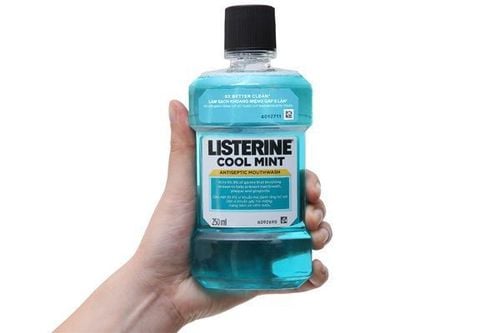
Nước súc miệng Listerine có thể giảm tình trạng mụn bọc ở mũi
4. To prevent acne on the nose
To prevent acne in general and acne in the nose in particular, the first thing you need to do is basic skin care. Make yourself a habit that always keeps your skin clean, cleansing the skin will help remove dirt, open pores, and limit acne on the nose. Wash your face twice a day to remove dirt, excess oil and sebum from the skin. However, you should not wash your face too much because it will strip away the necessary oil on the skin, contributing to increased sebum production. Drink plenty of water to hydrate the skin and prevent the skin from producing too much sebum. Avoid oil-based makeup products, as this will increase the likelihood of clogging pores. Water-based makeup products are more recommended for acne-prone skin. Choose makeup remover suitable for each skin type and perform makeup remover before going to bed. Clean, firm and moisturize skin regularly. Follow a skin care regimen that helps skin maintain a stable pH and prevents clogging of pores. Avoid exfoliating your skin every day, as doing too much can stimulate sebum production on the skin. Use a gentle exfoliator whenever. Building a scientific nutritional menu. Research shows that a low-carbohydrate diet can help clear up acne. Don't forget to use sunscreen. Because direct exposure to ultraviolet rays can dehydrate the skin and body, leading to overproduction of sebum. Consider choosing the right sunscreen for your skin to avoid clogging your pores. Absolutely do not pop pimples. Popping pimples can disrupt the skin barrier and infect the pores, causing more breakouts. This can eventually cause scabs and scarring on the face. In short, acne on the nose is a very common skin disease with the main cause being an increase in sebum secretion. Although not harmful to health, acne on the nose can lead to many nuisances, affecting the aesthetics of the whole face. At this time, you should not arbitrarily pop pimples but follow good skin care instructions, both to help control acne and help avoid future recurrence.
Please dial HOTLINE for more information or register for an appointment HERE. Download MyVinmec app to make appointments faster and to manage your bookings easily.




